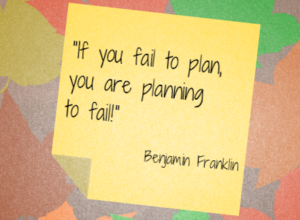6 August 2017 by Lisa Meloncon
 The beginning of August has always signaled the end of the summer. Even though school doesn’t start for most us for another 4 or 5 weeks, the pre-term meetings will begin within the next week or so and the slower pace of summer starts to shift into the regular flow of the fall.
The beginning of August has always signaled the end of the summer. Even though school doesn’t start for most us for another 4 or 5 weeks, the pre-term meetings will begin within the next week or so and the slower pace of summer starts to shift into the regular flow of the fall.
This end also signals another moment where many academics experience a wide range of emotions related to what they did (or did not) accomplish this summer. A common problem is making a summer to-do list that is too ambitious and thus totally un-achievable. And not achieving it all often leads to all sorts of anxieties and emotions, which isn’t the best way to end the summer and get ready (emotionally, physically, mentally) for the fall term.
So while we may be lamenting the final days of summer, I want to encourage everyone to take this time now to plan and strategize for the fall (and even into the spring). Since there is still is a semblance of slowness to these early days of August, it gives us the opportunity to honestly think through what we want and need to accomplish this fall.
I am a broken record about making reasonable and doable work plans. The big question that most people have is how to do that. There is no magic bullet and there’s tons of advice out there on how planning and such. So I’ll just give you an overview of the major steps that need you need to do to make a term plan.
You can write these down in a variety of ways. When I first started my full-time job, I did this process in a spreadsheet because that same excel workbook also had a manuscript/project sheet. Now, I’ve evolved and do this process in my planner (which is an action day at the moment). You can also do this on a large erasable, monthly/yearly whiteboard or on hard copy calendar pages. In short, you need to do this process in a way in which you’re comfortable and familiar and/or a way that makes sense to you and the way that you work.
Start by writing down all the dates that are confirmed
- Start and end dates for the term (including exams if you do them and including grade due dates)
conference dates (including travel days and an extra day after you get back) - teaching times and office hours (for graduate students include your classes as well)
- regular meetings (like faculty meetings, meetings with advisees/advisors, etc.)
- self care (regular gym times, weekly dinner or drinks with friendsfamily obligations (all of those dates and times that you need to take care of in the process of taking care of and being part of your family)
All of these things typically can’t be moved nor negotiated. Once you have all of these things down, then you need to carefully and strategically think through when you can carve out some writing/research thinking time. (And keep in mind when I write writing and research this is a stand-in term that can also mean time you’ll need to accomplish large administrative tasks or whatever else that your specific and unique job requires.)
Now, for your sanity, you need to find a couple of hours in the schedule that you block off with nothing written in them. This becomes your wiggle room for when things go awry and helps you move things around without the whole world falling apart (or feeling like it is).
Block off writing and research time
You need a couple of blocks of time a week or shorter blocks every day. You need to make sure that you have time scheduled to the do work you need to do based on your own preferences and writing/working style. For some people that means writing some every day. For other people that means three big blocks of time. For others this means that they get up early or stay up late and then make other allowances in their schedules. In other words, the when and where you block off your writing time is as personalized as our writing styles. The point is to block of the time.
 Make a project list
Make a project list
Then make list (on just some other paper) of the projects that you’re currently working on that are not finished or projects that will need attention during the fall (e.g., those those conference papers). List these in order of the most important (based on whatever criteria you choose). I use project here deliberately and also not in the typical academic sense. Project could be a large service project that means a lot to you and your career goals or it could be working on a new class in the fall that you’re scheduled to teach in the spring. It can also be a committee report that you know you’ll have to complete for a committee you chair. It can also mean a research project. Our projects will vary based on our jobs and our own personal goals.
Now that you have your major projects written down in priority order, then you need to get down to the hard business and accepting that you won’t get all the things done that you want to get done because even the best laid plans will go awry. So take a deep breath, and now, mark through everything on the list except the top two or three things. (This number is slightly arbitrary, but for most academics without an RA or not part of a large collaborative team, that’s about all that a person can get accomplished well and with your mental and physical health intact.)
Create project deliverables
Now with some workable projects fit into a reasonable and realistic plan for the term, you need to go about breaking down the projects into manageable, doable chunks. ‘Writing on X” is not a doable item. Writing the analysis for X is a doable. By breaking down projects you can put them into your calendar into those times you already blocked off AND more importantly, it gives you the flexibility to shift chunks into and out of the scheduled times depending on the ebbs and flows of your life and your health and your department/colleagues.
And if you put everything into the term and you see that there’s not a whole lot of down time, then I would strongly encourage to be more strategic in saying yes and no. I want to repeat my other mantra: we don’t have to work all the time and to shift the culture of needless overproduction, we have to be kinder to ourselves and say no.
So that’s how I go about scheduling my term (year).
Wishing you joy, peace, and health as you close out the summer!